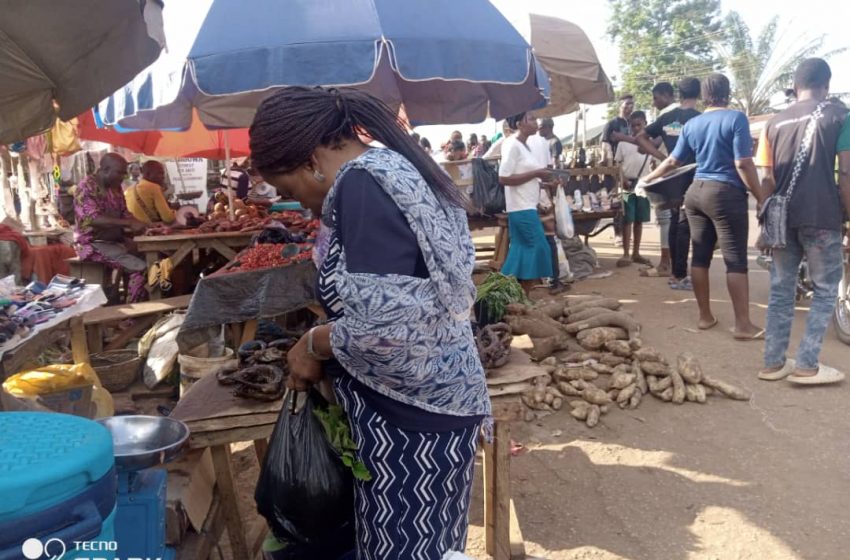For Twentyten Daily, Taiwo Babatunde visited market places around tertiary institutions and spoke to traders on the increase in food prices and how it is affecting the growth of their businesses
Ugwu Jullieth is a trader at Oye market in Ekiti where she sells rice, beans and other food items. This market is just 50 naira bus drives from Federal University Oye-Ekiti, one of the tertiary institutions in the state that schools over 7000 students per session.
For Jullieth, selling at this market is strategic as it avails her the opportunity to get more patronage from the students of the institution which in turn yields more profit.
In her small shop where she makes an average of N30,000 daily, Jullieth ensures to always restock her market all the time. Her gain, however, dropped after the COVID-19 pandemic hit the country suspending almost all economic activities. This translated to an increase in food prices.
“Things have been expensive since the COVID-19 era. Almost every day, there are additional increments in the prices of foodstuff. Both the sellers and buyers are complaining bitterly about it.
“The cost of selling goods has affected my business. The money I spend on purchasing three products is not used to get just one product and this can never grow any business.”
Recounting her ordeal to this reporter, she said, “If I take 300,000 to the market before I will buy about 15 bags of rice but now even if she carries 400,000, I would not be able to buy up to that despite that the price varies on the type, quality and availability of the product in the market.
“My major customers who are students patronize me with love because they know that she usually sells at a cheap rate.”
Another trader, Mrs Fabusuyi, who sells foodstuff at the same market said that the consistent increase in food prices has restricted many traders from diversifying into several other businesses.
“Gone are the days where one can establish a business with small capital. It has also affected the way students patronize me. Things are really expensive. There are sometimes students underprice and they end up not buying anything.”
Twentyten Daily gathered that while people are adjusting to the consistent increase in food prices, traders in market places are recording more losses than profit.
Market profit Dropped
Fabusuyi told the reporter that the continuous increase in food prices affect the profits from her business as most of it is spent on transporting the goods to her store.
“A cartoon of noodles that were normally carried for 50 naira is now carried for 200naira. It is only some drivers that pity me that collect N150”, she said.
Another Blessing Ogbonna, a trader at Ilupeju market located in Ekiti State, lamented saying, “it affected the way I make profit because no be the money wey I dey sell before I dey sell now”.
When the reporter asked if she sought to apply for a loan, she noted that she had considered but declined the offer as she might have ended up using the profit made to repay the loan.
“I have not collected a loan since I started my business because if I collect the loan now, I will convert it to interest. The little one I have is what I am using to manage myself”, she said.
On the contrary, Mrs Oni, who also sells food items in Oye market said that as a means to grow her business she collected a loan. “Yes, I collected a loan. I collected the loan as an alternative to growing my business and it helped over time. Though it was rough, that was the best option I had” she stressed.
Transportation–a major hindrance
The high cost that comes with transporting these products also plays a key factor in growing their business or profit, the traders told this reporter.
“The transportation fee is too expensive”, Miss Sandra, a trader in Ilupeju market said. “Like before from here to Ibadan was 1000 naira but now from here to Ibadan is 2000 naira, just to go, not to and fro”, she added.
For Blessing Ogbonna, another trader at Ilupeju market, explained to the reporter that this high transportation fee spent in moving her product translated into the increase seen in food prices
“High Transportation affects our market because the load we were supposed to carry at the rate of 500 naira before, they carry 1000 naira now. The drivers would say that there is no fuel.
“There is no point that the police would not collect bribes. Even though you don’t carry loads. Unless you are in a private car, but if you are in a commercial car, the police will surely collect money”, she said.
A way out
However, Ogbonna opined that the reopening of land borders and relaxing some restrictions could be a better solution.
“The government should open the border. It is the closure of the border that causes all these problems. If the borders are opened and things from other countries are coming in, everything will be back to normal, because as the border has been closed, Nigerians are selling what they have. After all, all the companies in Nigeria can’t cater for everybody in Nigeria because of the large population “.
“Let the government do what they want to do to reduce the cost of commodities and also open the closed border”, Mrs Ojudu Juliana said.
On the part of Sandra, another trader at the market, she said, “If the government wants to help us, I think the first thing to do is to reduce fuel prices because everything is coming from fuel increment”.
“If the fuel price decreases, I think it will get better than before”, she added.
- This is a three part series report produced to highlight the struggles of how students in Nigerian tertiary institutions are dealing with the increasing food prices despite the consistent drop in inflation

